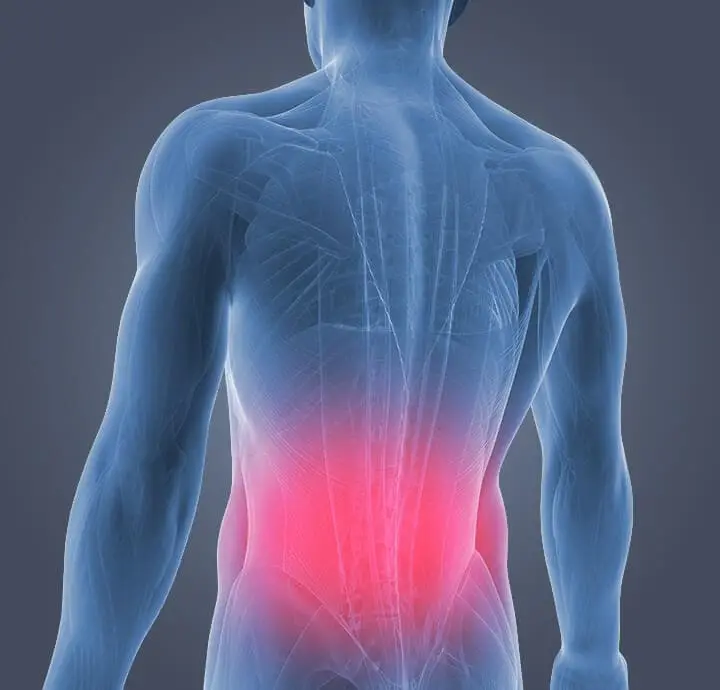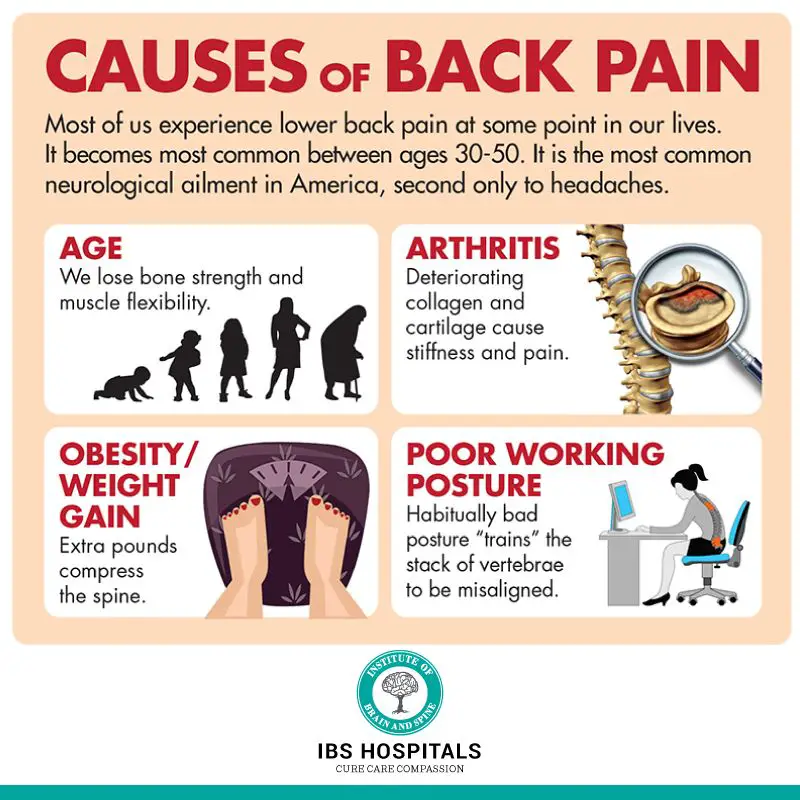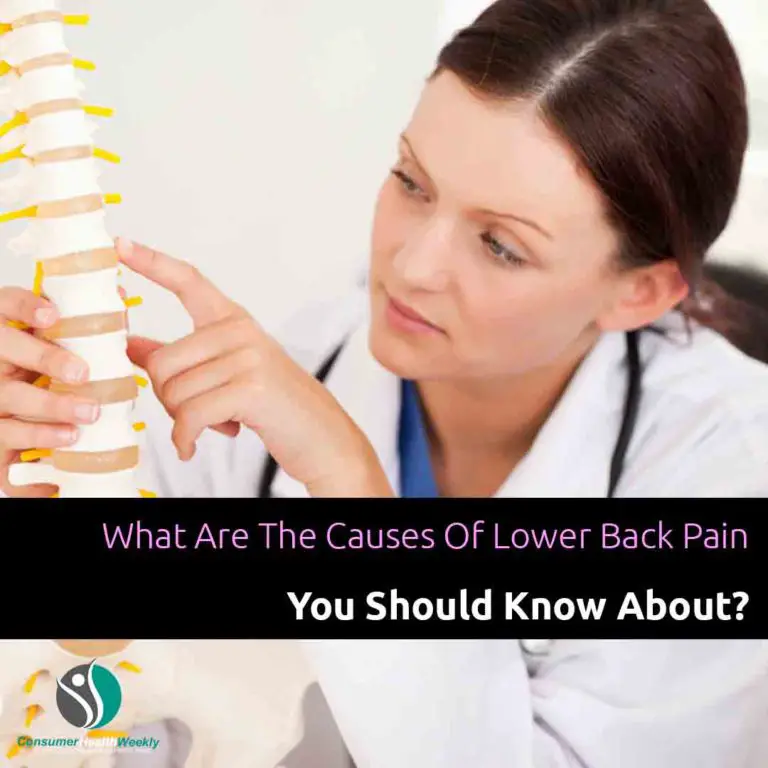Signs Your Back Pain Might Be An Emergency
In our 20s and 30s, normal back pain often can be attributed to factors of daily life, such as sitting too long, picking up children, or overdoing it while exercising.
In our 40s and older, work injuries and the beginnings of arthritis and degenerative conditions are more common.
Back pain is so common, in fact, that many patients shrug off symptoms that might indicate a medical emergency.
Approximately 80% of adults will experience back pain in their lives, so its important to be able to identify the severity of your symptoms and track how long the pain lasts.
If back pain can be associated with a specific activity, such as lifting or twisting wrong, and the pain goes away within 72 hours after resting and applying ice, its usually nothing to worry about. However, if pain creeps on gradually, appears suddenly, or doesn’t go away, you might have a more serious condition.
Low Back Pain Diagnosis
Getting diagnosed with a specific cause of low back pain is the first step to getting treatment. If you land in your doctors office hoping for back pain relief, theyll use a variety of diagnostic tools and methods, such as:
-
A thorough medical history including any recent injuries, other diagnoses, family history of disease, and your job, activities and other lifestyle considerations
-
Physical exams, which may include manipulating the painful area or reflex or other neurological tests
-
Electromyography, which measures muscle and nerve function
-
ImagingX-rays can show bone spurs and damage to bone, while CT scans and MRIs can depict damage to soft tissue like discs or ligaments
What Are The Symptoms Of Back And Neck Pain
Symptoms associated with back pain may include:
-
Dull, burning, or sharp pain in your back. The pain can be confined to a single spot or cover a large area
-
Leg numbness or tingling above or below your knee
-
Stiffness or achiness that occurs anywhere along your spine
-
Sharp, shooting pain that radiates from your low back to your buttocks, down the back of your thigh, and into your calf and toes
-
Consistent ache in the middle or lower part of your back, especially after standing or sitting for an extended period
Loss of bladder and bowel control, with weakness in both legs, are symptoms of a serious condition that requires immediate medical attention.
Symptoms associated with neck pain can be:
-
Arm numbness or tingling
-
Sharp shooting pains or a dull aches in your neck
Pain that occurs suddenly in your back or neck, due to an injury, is considered to be acute pain. Acute pain comes on quickly and may leave sooner than chronic back or neck pain. This type of pain should not last more than 6 weeks.
Pain that may come on quickly or slowly and lingers for weeks, 3 months or greater, is considered to be chronic pain. Chronic pain is less common than acute pain.
Also Check: How To Get Relief From Lower Back Pain
When To Contact A Medical Professional
- Back pain after a severe blow or fall
- Burning with urination or blood in your urine
- History of cancer
- Loss of control over urine or stool
- Pain traveling down your legs below the knee
- Pain that is worse when you lie down or pain that wakes you up at night
- Redness or swelling on the back or spine
- Severe pain that does not allow you to get comfortable
- Unexplained fever with back pain
- Weakness or numbness in your buttocks, thigh, leg, or pelvis
Also call if:
- You have been losing weight unintentionally
- You use steroids or intravenous drugs
- You have had back pain before, but this episode is different and feels worse
- This episode of back pain has lasted longer than 4 weeks
How Is Lower Back Pain Diagnosed

Your provider will ask about your symptoms and do a physical exam. To check for broken bones or other damage, your provider may order imaging studies. These studies help your provider see clear pictures of your vertebrae, disks, muscles, ligaments and tendons.
Your provider may order:
- Spine X-ray, which uses radiation to produce images of bones.
- MRI, which uses a magnet and radio waves to create pictures of bones, muscles, tendons and other soft tissues.
- CT scan, which uses X-rays and a computer to create 3D images of bones and soft tissues.
-
Electromyography to test nerves and muscles and check for neuropathy , which can cause tingling or numbness in your legs.
Depending on the cause of pain, your provider may also order blood tests or urine tests. Blood tests can detect genetic markers for some conditions that cause back pain . Urine tests check for kidney stones, which cause pain in the flank .
Also Check: What Specialist Treats Back Pain
Lower Back Pain: What Could It Be
Do you have lower back pain? You are not alone. Anyone can experience lower back pain at any time, even if you dont have a prior injury or any of the risk factors. It is not always serious and can often get better on its own. But in some cases pain is your bodys way of telling you that something isnt right.
Learn more about lower back pain and what causes it from rehabilitation physician Akhil Chhatre, M.D., who specializes in back pain in the Johns Hopkins Department of Physical Medicine and Rehabilitation.
Sensations That Might Indicate A Medical Emergency
1. Sharp pain rather than a dull ache: This could indicate a torn muscle or ligament, or a problem with an internal organ in the back or side.2. Radiating pain: This pain moves or shoots to the glutes or legs, which could indicate a nerve compression condition.
3. Sudden weakness in the legs: Limb weakness can be caused by compressed nerves in the spine due to conditions like sciatica or spinal stenosis. However, sudden leg weakness could also indicate a stroke.4. Incontinence: Back pain paired with inability to control the bowels or bladder might be a sign of serious nerve compression or a spine infection, such as discitis or meningitis.5. Numbness or pins and needles in the groin or glutes: This is known as saddle anesthesia and is also a sign of a serious nerve or spine condition.
If you have leg weakness, incontinence, and numbness together, you might have cauda equina syndrome, a serious illness characterized by spinal cord nerve damage. This is a medical emergency, and patients usually need surgery immediately to decompress the nerves and reduce permanent damage.
Donât Miss: Will Physical Therapy Help Back Pain
Recommended Reading: What Does Chiropractor Do For Lower Back Pain
Lower Back Pain Diagnosis
To help diagnose your lower back pain, an expert at UPMC Sports Medicine will observe the way you walk and move.
He or she will also ask you about the sports you play and other things you do each day that might cause your back pain.
Along with an exam, certain tests can pinpoint the cause of lower back pain.
Some tests look for issues with hard structures, like your spine or bones.
These may include:
- Bone scans to look for breaks, infection, or tumors in the backbones.
- Bone density studies to help diagnose osteoporosis.
Other tests look for problems in soft structures, like the nerves and spinal cord
These tests may include:
- MRI scans to take pictures of the lower back nerves or spinal cord.
- Electromyography and nerve conduction velocity tests to see how well the electrical signals in your nerves send messages to your arms and legs.
Chronic Low Back Pain Of No Specific Origin
Low back pain is defined as pain, tightness, and stiffness between the lower end of the rib cage and the buttocks. “Chronic” means the pain has lasted for twelve weeks or longer, and “no specific origin” means the pain cannot be traced to any specific cause, incident, or injury.
Most susceptible are individuals who perform heavy physical work, especially when there is ongoing anxiety, depression, and emotional stress at the same time. The longer the stress and back pain continue, the more difficult it is to ease the symptoms and return the patient to normal functioning.
Treatment involves nonsteroidal anti-inflammatory drugs and sometimes opioid medications for pain, though both have risks when used long term. Antidepressants may also be tried, along with psychological counseling.
Corticosteroid injections for the back are effective for some patients, and fusion surgery is sometimes attempted. Lifestyle changes in the form of improved diet, exercise, and stress management are very helpful in most cases.
Rarity: Common
Top Symptoms: lower back pain, unintentional weight loss, back pain that shoots to the butt, fever, involuntary defecation
Symptoms that always occur with chronic low back pain of no specific origin: lower back pain
Symptoms that never occur with chronic low back pain of no specific origin: thigh numbness, buttocks numbness, lower back pain from an injury
Urgency: Primary care doctor
Don’t Miss: How To Lay In Bed With Lower Back Pain
Here Are Some Of The Specific Reasons For The Pain
It can be a result of constant bad habits like always slouching or moving your head forward while performing some activity. It can also be caused by infection and inflammation, likely kidney stones or appendix. There are numerous reasons for a person to be diagnosed with back pain. Likewise, the solution also varies with the varied diagnosis.
What Can I Do For Low Back Pain At Home
If your lower back pain has just started, the best thing you can do is start a log. Record your symptoms, times, dates and which activities trigger the pain or make it worse or better. Take this information to your family physician if the pain doesnt resolve on its own. It will make diagnosing the cause much easier.
Once you know which motion or position causes your lower back pain, try to avoid it and see if you get better. Icing the painful spot can also help. And so can over-the-counter pain relievers that help reduce inflammation. Just remember that pain killers treat only the symptom pain and not its cause.
Also Check: How To Fix Back Pain Fast
How Is Back Pain Diagnosed
Most people who develop low back pain that comes on suddenly have nonspecific low back pain. If there are no other associated symptoms and the pain is not too bad, many people are confident to just ‘get on with it’ and treat it themselves – and indeed most get better quickly. However, if in doubt, see your doctor for a check-over and advice.
A doctor will usually want to ask questions about your symptoms and to examine you. Basically, the symptoms are usually as described above, with no other worrying symptoms to suggest anything serious or another cause of back pain . The examination by a doctor will not detect anything to suggest a more serious cause of back pain. Therefore, a doctor can usually be confident from his or her assessment that you have nonspecific back pain.
As a general guide, if any of the following occur then it may not be nonspecific low back pain, and there may be a more serious underlying cause. But note: the vast majority of people with low back pain do not have any of the following symptoms or features. They are included here for completeness and as an aid to what to look out for and to tell your doctor should they occur.
Lower Back Pain: Causes Reasons And Relief

At some point or another, most of us–about 80% of all adult Americans, according to the National Institutes of Health–experience lower back pain. Its the single biggest cause of worker disability, and it leads to more missed work days than any other medical complaint. Its also ranked as the third biggest cause of poor health and mortality in the U.S., right behind heart disease.
If youve experienced lower back pain at any point in the last three months, youre not alone. The NIH reports that one in four adults has been there, too. Lower back pain is more than just annoying and disruptive–its a serious health challenge that can negatively affect your quality of life and longevity if you ignore it. Why? Because if youre not exercising or moving around because youre in pain, your cardiovascular health, your sleep, and your state of mind can suffer.
Untreated back pain can spiral into other illnesses, which is why its important to get to the source of whats causing yours–and look for ways to improve it.
You May Like: Does Advil Help With Lower Back Pain
What Is Lower Back Pain
Low back pain can result from many different injuries, conditions or diseases most often, an injury to muscles or tendons in the back.
Pain can range from mild to severe. In some cases, pain can make it difficult or impossible to walk, sleep, work or do everyday activities.
Usually, lower back pain gets better with rest, pain relievers and physical therapy . Cortisone injections and hands-on treatments can relieve pain and help the healing process. Some back injuries and conditions require surgical repair.
Chronic Low Back Pain
Chronic low back pain is a common condition. It is defined by low back pain lasting more than six weeks. Unfortunately, a clear cause can only be found in twenty percent of cases. The rest of the time, it is believed to be due to strain on the bones and muscles of the back from heavy lifting, prolonged sitting, or bad posture.
For back pain persisting longer than six weeks, it is recommended to make an appointment with a physician. Treatments may include a program of back exercises, as well as pain medicine such as ibuprofen and acetaminophen . It is also recommended to stay active and carry on with the things you usually do as much as possible, to help you recover faster. Sitting or lying still for long periods can actually make the pain worse. Your joints may become stiff which will make it harder and more painful to move your back.
Don’t Miss: How To Stretch Mid Lower Back
You’re Running A Fever
The flu can definitely make you run a fever and achiness, including in your back. However, if the fever is unresponsive to standard OTC medications, you could have a serious infection that needs treatment immediately. If you go to a doctor and they find an infection, they may prescribe antibiotics and a few days rest.
Anxiety Can Cause Neuropathy
Anxiety and stress do affect the body in many different ways. A few of the most obvious symptoms of stress include numbness, burning, tingling, and pain or discomfort when moving. These symptoms are very similar to what you might feel with neuropathy. Thats why its very easy to think you have neuropathy when you actually dont. If you assume thats what youre dealing with and never confirm it with your doctor, you wont be able to address the actual problem .
Recommended Reading: How To Relieve Lower Back Pain While Lying Down
You’ve Been In Pain For Over A Week
Most back pain will subside after a few days, but if you’ve been experiencing pain for over a week, then it’s time to call a doctor. Your doctor will perform any examinations or tests required to help get to the bottom of your pain before it could become a bigger problem. As is the case with many health conditions, prevention and addressing problems early is key.
Do Kidney Stones Always Cause Back Pain Lets Find Out
Kidney stones are a common and painful occurrence among people of all age groups. These are essentially hard deposits, caused as a result of mineral and salt accumulation from urine inside the kidneys. This can affect different parts of the urinary tract – be it the kidneys or the bladder.
There are various signs of kidney stones. If these are not detected in time, they can cause excruciating pain and discomfort. Sometimes, the stones can be passed by increasing fluid intake. But when they may end up getting stuck in the urinary tract or cause more complications, doctors usually suggest surgery.
Dr Shakir Tabrez, Senior Consultant – Urology, Uro-oncology, Andrology, Transplant and Robotic Surgery, Fortis Hospital, Richmond Road, Bengaluru, busts some common misconceptions about this health issue.
You May Like: How To Get Rid Of Low Back Pain Quickly
When Should I Contact My Healthcare Provider
See your healthcare provider soon if your lower right back pain is severe, constant or getting worse. You should see a provider quicker if you have lower right back pain plus:
- Urine that is bloody or cloudy, if it smells bad or if peeing is painful.
- You find blood or pus in your poop.
- Pain during or after sex.
Read Also: Who Do I See For Lower Back Pain
How Lumbago Can Affect Daily Life

Dr. Curry-Winchell emphasizes, “It can be debilitating. The muscles in the back help you stay active and allow small and big movements to occur. Everyone experiences back pain differently however, it is often associated with severe pain and impacts your ability to sit down or stand up. If you experience loss of control of your bowels, fever, or tingling/numbness this can be a medical emergency and it’s important to seek out care as soon as possible.”
Also Check: What Kind Mattress Is Best For Back Pain